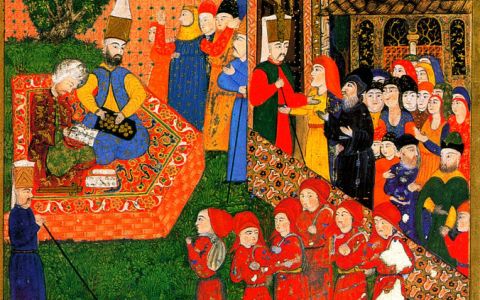Guest Blog: Boy soldiers are more evidence that ISIS are just thugs
by - 17th November 2014

By Guest Blogger JASON GOODWIN
ISIS - SO-CALLED ISLAMIC STATE - is recruiting boy soldiers, children as young as eight who can go about arresting people while weighed down with their own firepower.
Under the Ottoman Empire, boys of the same age were taken from their parents and turned into soldiers, the fearsome Janissaries whose avowed aim was the conquest of Christian Europe.Setting the warlords of Isis, it would seem, a useful precedent.
The Ottoman devsirme, or boy tribute system, was regularised in the fourteenth century, as Ottoman rule expanded across the Balkans, and discontinued in the seventeenth century.
It developed from the Koranic injunction that accords a successful leader one tenth of the booty of war for his own personal share: the property as well as the lives of his defeated enemies. In other words, soldiers from a defeated army could be enrolled in the army of the victor.
The extent to which the early Ottoman enterprise was uniquely Islamic – or even Turkish –has been hotly debated in recent years. Some early Ottoman commanders were Greek, or Serbian, by birth and upbringing. It was a Genoese fleet that shipped the first Ottoman armies across the Dardanelles and into southern Europe, while the conquest of the Balkans was made in a shifting kaleidoscope of alliances with non-Muslim powers. The siege of Istanbul, in 1453, was attended by thousands of non-Muslim troops and the cannon-founder who created the largest cannon ever used in mediaeval warfare to date was a Hungarian Catholic. Only later, when native dynasties had been eradicated under PaxOttomanica, were Ottoman armies predominantly Muslim.
The devsirme, or collection, extended to the dar-ul-islam, the Abode of Peace, a rule that technically applied only to the dar-ul-Harb, or the Abode of War. The Janissaries were a slave army, in a long Middle-Eastern tradition, enslaved precisely because they were not Muslims: the enslavement of Muslims was forbidden.
As slaves of the sultan they were bound to absolute obedience; in the early centuries they were also not allowed to marry or live outside barracks until they retired. The sultan, who ceremonially enrolled in a Janissary regiment, drew his pay along with his men.
Men, not boys. Every few years the devsirme would do the rounds of valleys and hills in the Balkans, enlisting – or enslaving – boys from the age of about eight upwards from Christian families.
They would be marched down to the shore and shipped across to farms in Anatolia, where they would learn Turkish, and recite the declaration of faith that made them Muslims. In many places the tribute was resented, although in Bosnia families would attempt to bribe the collector to pick their child.
Not all were destined for the army, or the ranks of the janissaries. Boys selected for their exceptional mien, strength and intelligencemight enter the palace school, to be trained as pages.
In the classical Ottoman system, it was from their ranks that the functionaries of the palace, and the empire, were drawn. Sinan, who in his old age became the greatest of Ottoman imperial architects, was a devsirme man. So were the hundreds of pashas who governed the empire, and the successive great dignitaries of the palace, including the Grand Vizier himself.
Although the Janissaries survived to 1826, and the Ottoman elite to 1922, the devsirme method of recruiting young Christian boys came to an end in the seventeenth century, not least because the elites pushed for their own children to be enrolled.
The Janissaries were not fundamentalists. They were on the contrary affiliated with the Bektashi order of Sufis, to whom much non-Koranic licence was permitted: they did not insist on the veiling of women or the rejection of alcohol.
The boys they took – and no doubt it was a grievance to the villagers whose menfolk were robbed – were exposed to the most extraordinary social mobility of the Middle Ages, or beyond: allowed, by talent, to become rulers.
The Isis boy-soldier culture has very little to do with the janissaries, who were created as part of a ruling élite. It far more resembles the African boy soldiery resorted to by warring gangs.
Isis are not confident. They are not a state. The Ottomans were both.

Jason Goodwin is an award-winning travel writer and historian. His latest book Lords of the Horizons: a History of the Ottoman Empire is published by Vintage.
